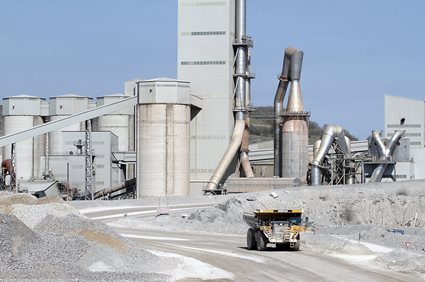 The Mineral Products Association (MPA) is disappointed that UK cement and lime producers have been excluded from the Government’s compensation scheme for climate change costs.
The Mineral Products Association (MPA) is disappointed that UK cement and lime producers have been excluded from the Government’s compensation scheme for climate change costs.
MPA says the Government has missed an opportunity to support two essential industries during the current energy crisis, despite other industry sectors – which directly compete with cement and lime – receiving the compensation.
Under the Department for Business, Energy & Industrial Strategy (BEIS) scheme, some energy intensive industries – particularly those in internationally competitive markets – can apply for compensation from the indirect costs of the UK Emissions Trading Scheme (UK ETS) and Carbon Price Support (CPS) if they meet certain criteria.
In the Government’s 2021 consultation on the compensation mechanism, energy intensive industries needed to meet at least one of three tests to qualify, but BEIS has since decided to change this to require that industry sectors meet all three tests. In the process of determining eligibility the Government also changed the thresholds of the tests, increasing two out of three but choosing to lower the ‘Indirect Emission Intensity’.
Evidence submitted to the Government by MPA in response to the original consultation showed that cement and lime are well above the threshold on ‘Indirect Emission Intensity’ and cement is also clear of the threshold on the Indirect ‘Carbon Leakage Measure’.
The change in the test criteria means that both cement and lime sectors have been excluded from receiving compensation. The impact of the decision is that these industries will continue to face energy costs millions of pounds higher than competitors in the EU as a result of paying the pass-through cost of the unilateral CPS as well as ETS costs.
That places UK cement and lime producers at a competitive disadvantage in international markets. In turn this makes the UK a less attractive place for overseas investment, and in the long run risks pushing the industry into an uncompetitive position, contrary to the Government’s own stated ambitions.
Dr Diana Casey, Director for Energy and Climate Change at MPA, said:
“It is extremely disappointing that having met the criteria set out in the consultation, BEIS has decided to move the goalposts and exclude cement and lime from the scheme. UK manufacturers of all products face higher electricity and gas costs than European competitors, and this decision misses an opportunity to support the competitiveness of the UK cement and lime sectors, both essential foundation industries, especially during the current energy crisis and rapidly rising costs. Reaching net zero and delivering our economic potential requires huge investment from global businesses and it becomes harder to make the case for the UK as a location for such investment if policy costs make operating in the UK uncompetitive.”
MPA remains engaged with BEIS ministers and officials to continue to press the case for UK cement and lime producers to be included in the scheme.
ENDS
Notes to Editors:
More about the carbon pricing compensation scheme
The original BEIS consultation set out 3 quantitative criteria, and an industry sector had to pass one of these to then be progressed to the qualitative assessment. The consultation response notes that BEIS changed the criteria and decided that a sector had to pass all three tests before progressing to the qualitative criteria. A comparison of the change plus the average cement and lime data is shown below.
|
Criteria
|
Threshold required to be met as set out in the consultation paper
|
Threshold used
by BEIS in determining the list
|
Cement average 2016-2018
|
Lime average 2016-2018
|
|
Indirect Carbon Leakage Measure (ICLM)
|
0.22
|
0.36
|
0.41
|
0.25
|
|
Trade Intensity
|
20%
|
45%
|
12%
|
20%
|
|
Indirect Emission Intensity (kgCO2/ £GVA)
|
1.1
|
0.8
|
3.44
|
1.24
|
Further details of the scheme can be found at:
https://www.gov.uk/government/publications/uk-emissions-trading-scheme-and-carbon-price-support-apply-for-compensation
UK Concrete and Cement Industry Roadmap to Beyond Net Zero:
The UK Concrete and Cement Industry has reduced carbon emissions by 53% since 1990 and has a robust and credible Roadmap to go Beyond Net Zero by 2050. For details go to: https://mineralproducts.org/Sustainability/Net-Zero-Carbon.aspx
About the Mineral Products Association:
The Mineral Products Association (MPA) is the trade association for the aggregates, asphalt, cement, concrete, dimension stone, lime, mortar and silica sand industries. With the merger of British Precast, and affiliation of the British Association of Reinforcement (BAR), Eurobitume, MPA Northern Ireland, MPA Scotland and the British Calcium Carbonate Federation, it has a growing membership of 520 companies and is the sectoral voice for mineral products. MPA membership is made up of the vast majority of independent SME quarrying companies throughout the UK, as well as the 9 major international and global companies. It covers 100% of UK cement and lime production, 90% of GB aggregates production, 95% of asphalt and over 70% of ready-mixed concrete and precast concrete production. In 2018, the industry supplied £16 billion worth of materials and services to the Economy. It is also the largest supplier to the construction industry, which had annual output valued at £172 billion in 2018. Industry production represents the largest materials flow in the UK economy and is also one of the country’s largest manufacturing sectors.
For media enquiries, contact Elizabeth Clements at: Elizabeth.Clements@mineralproducts.org